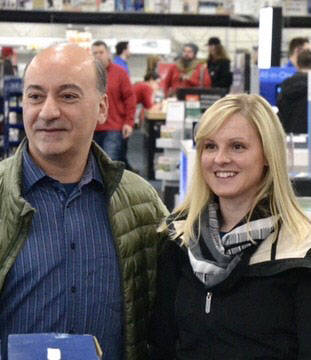By Les Gara and Amanda Metivier
May is National Foster Care Awareness Month. During a pandemic that’s ravaged families and the economy, you might guess the foster care system and the youth it serves have been harmed as well. There couldn’t be a better time to raise awareness of how we can help and to remember that foster youth, like all of us, deserve a fair chance to succeed in life. We’ve all experienced difficulty, a loss of normalcy and isolation from family and friends during the pandemic. Many foster youth, already separated from parents and siblings, have battled more loneliness and trauma.
To make things harder, we have fewer foster homes today than we did before COVID. Of the licensed families that remain, many have understandably put a hold on taking in youth because they fear infection. That’s been awful for foster youth. But today, with vaccines available for those who want them, we hope families will open their homes again.
Alaska has lost 10% of our licensed foster homes over the past year, and we didn’t have enough before COVID. There’s no official count of licensed homes that remain but are not taking in youth during COVID. Combining both categories of lost homes, one caseworker struggling to find good homes estimates that we’ve lost about 40% of the homes available to take in new youth.
We hope that if it’s the right time in your life, you’ll consider being a foster parent or adopting a youth from foster care. If you were a foster parent but stopped taking in youth because of COVID, we want you to know you’re needed now more than ever.
Lives will be improved, and childhood trauma reduced, if we let people know Alaska is in dire need of caring foster families. That includes loving relative homes. Relatives know and often care deeply about uprooted youth.
In 2018 we added a needed statutory duty for the State to actively recruit foster and adoptive families. If you are part of a group with meetings, we hope you’ll ask state officials to appear to explain this need for foster and adoptive families to your members. With federal COVID relief funds hitting the streets, we hope some will be used for an ad campaign to get the word out, because Alaskans step up to help when asked.
Without enough caring foster homes, and loving “forever” adoptive homes, youth are more likely to bounce between the few homes we have left, or worse, linger in shelters and facilities. In many cases those homes are over-stressed, and are denying state requests to take in more youth. Getting youth back to their natural homes, or if not, to a stable foster and then adoptive home, reduces the trauma foster youth suffer. Bouncing them between temporary homes, and in greater frequency this past year, into homelessness, adds often irreversible trauma to the lives of youth we want to be happy, healthy and successful.
Maybe you run a business, and will hopefully get back to hiring again. If you’re able, please consider hiring a youth in foster care, or a youth battling homelessness, and assigning a co-worker to help mentor them so they can succeed in life. The Independent Living Program at the Office of Children’s Services, which helps steer older youth to success (Email hss.ocs.independentliving@alaska.gov), or great nonprofits like Facing Foster Care in Alaska, Covenant House, My House and Tribal foster care partners would love to know you’re willing to help.
We started a volunteer program that asks stores across the state to offer discounts for new clothing to foster youth. We started FosterWear so foster youth know they are equals in our community. Thanks to REI for being the first store to join, to make the point that foster youth deserve quality clothing just like the peers they go to school with. Does your store want to help? Call the Office of Children’s Services’ FosterWear Coordinator at 465-3571.
This is a tough time for youth. With in-person work by the Office of Children’s Services compromised during COVID, it’s taken more work to get less done, which has been frustrating for workers who want to help. It’s been frustrating for families and youth.
If you’re in a position to help, COVID has possibly made you more important to foster youth than ever. Thank you!
Les Gara is a former state representative and former foster youth. Amanda Metivier is associate director of the Child Welfare Academy, co-founder of Facing Foster Care in Alaska, a social worker and former foster youth.

